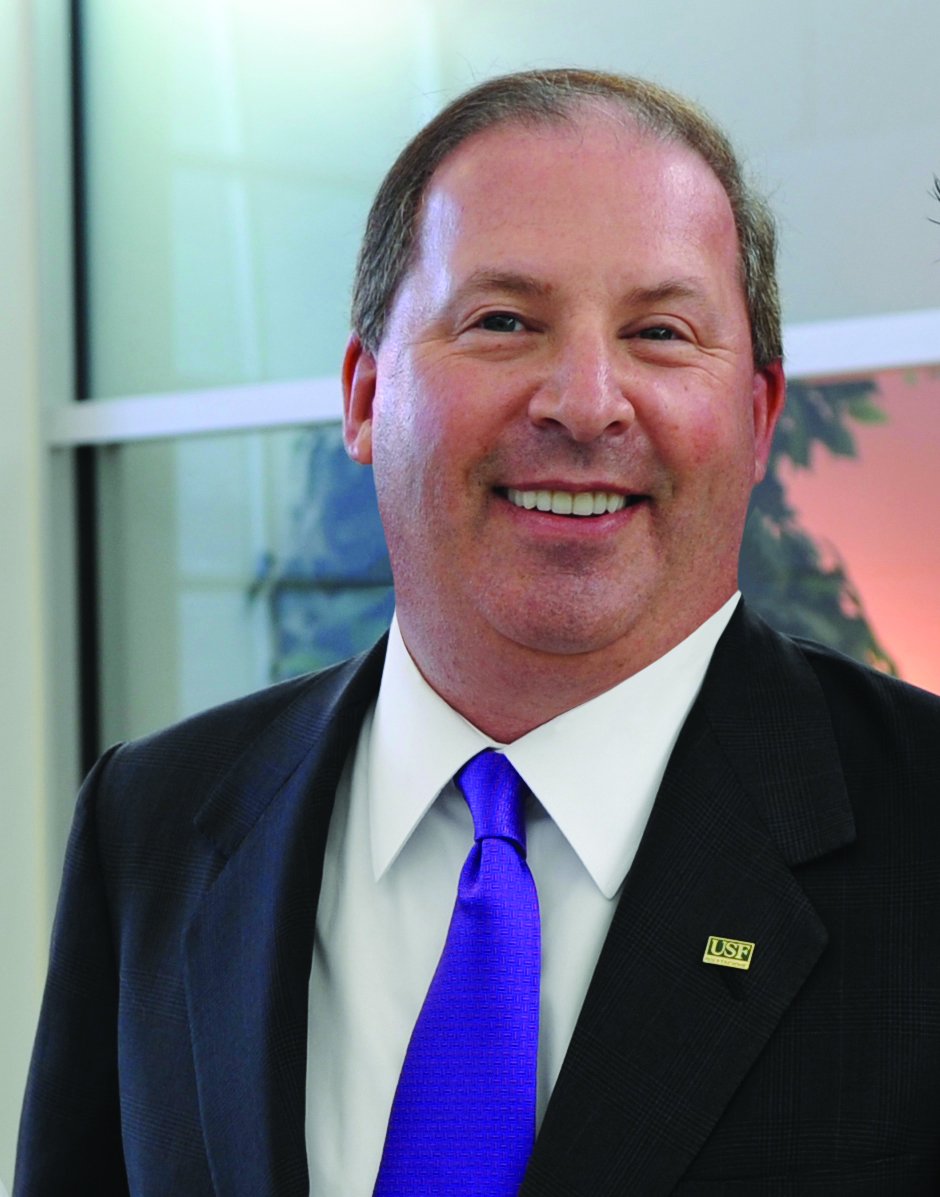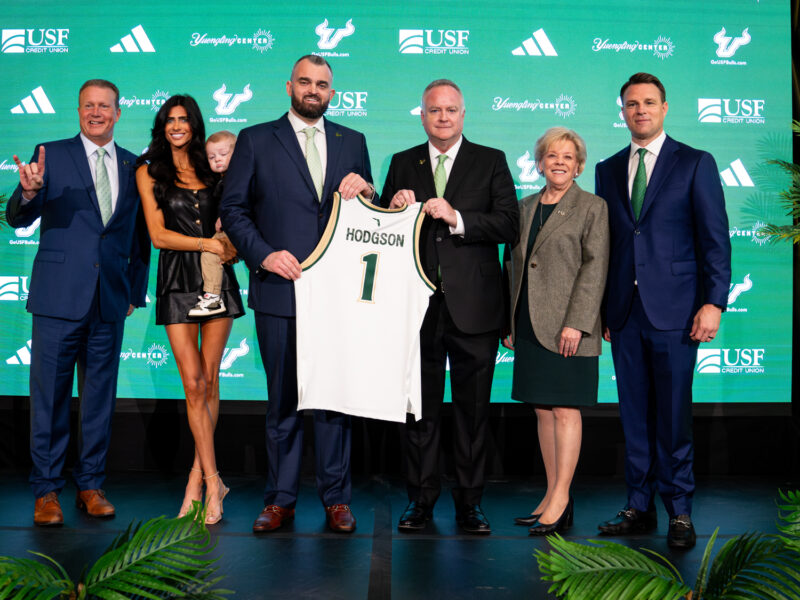Photos courtesy of USF
Apparently, she does, and several members of the Board of Governors committee overseeing the transition were not happy with the removal of Goodman on Dec. 20.
Dean Colson, then Chair-elect of the board, called for an emergency meeting on the 22nd to question Genshaft and USF Board of Trustees Chair John Ramil.
“We made clear we would monitor the transition and expected collaboration between the University of South Florida and our board on major issues, and I really don’t believe that collaboration has taken place,” Colson said.
He admitted that the board has little control over personnel matters, but would have expected that on a decision of this magnitude, the board be consulted.
“I believe that President Genshaft did not want to come before [the board’s January meeting] and have an open discussion about why she felt the chancellor had to be let go,” said board member Norman D. Tripp. “She’s the one that hired him in the first place. When did he fall off the cliff? When did he become somebody so bad that he couldn’t do what he was originally hired to do?”
He also accused Genshaft of continuing to protest the split by emailing “a constant barrage” of “politically driven and negative” newspaper articles about the board’s Nov. 9 decision.
“What’s your point?” he said he replied to these emails. “Is your point that you’re right and that everyone else is wrong?”
Ramil and Genshaft called board members individually the night before that Goodman would be fired. According to Tripp, Genshaft did not inform him that David Touchton, a vocal opponent of Poly independence, was already chosen to lead the Polytechnic temporarily while the university searches for a permanent replacement.
Touchton, a USF alumnus, is an accountant in Polk County with experience in university and college accounting, but does not have an academic background.
Tripp said that Genshaft was not collaborating with the Board of Governors and implied that the firing of Goodman over the holidays was intended to blindside the board. “What she’s really said to us is ‘It’s my decision and I don’t care what you think, anyway,’ ” Tripp said.
Genshaft responded by defending the timing of the decision by saying that changes of this “magnitude” are typically made during the winter and summer academic breaks, in order to begin a semester “clean and clear.”
Goodman was fired following a vote of no confidence in his leadership by the faculty of Polytechnic. “In 35 years, in many different universities, I have never, ever been a part of an organization that had a no confidence vote,” Genshaft said. The students, too, have been requesting a change of leadership, she said.
The USF system is dedicated to establishing Polytechnic as a STEM-based institution, Genshaft added, denying accusations that she is trying to stall the independence process. She said that she “did not have any confidence” in Goodman’s ability to lead Polytechnic in meeting the mandated benchmarks for independence.
Ultimately, too, the decision to oust Goodman was up to the university and not the Board of Governors, said Genshaft—a point backed up by Ramil.
Personnel decisions were never a part of former collaborations between the university and the Board of Governors, Ramil said, but “if that’s the definition going forward, then that’s the definition we will all live with.”
Tripp asked Genshaft and Ramel when the plan to replace Goodman with Touchton happened. Genshaft deflected the question, again asserting that “personnel matters don’t need to come before everyone.”
“This committee shouldn’t be in the hiring and firing business,” said board member Dick Beard. “It’s certainly not our job.”
USF trustee and Fifth Third Bank Tampa Bay Market President Brian Lamb will be leading the search for Polytechnic’s new permanent chancellor.
In closing the hour-long conference call, Vice Chair Mori Hosseini reiterated that the board must be involved in decisions made at Polytechnic. “We are extremely displeased the way this thing went.”
Goodman has been backed by the powerful chair of the Florida Senate budget committee, J.D. Alexander, who has used his position to influence the board’s decision. Leaders in the USF university system have long been opposed to independence, but remained publicly agnostic until the weeks prior to the Nov. 9 vote.
Board member Michael Long, the student representative on the panel, accused Alexander of threatening funding for the university system if it did not vote for independence.
The relationship between Goodman and Genshaft had been further complicated by several high-publicity reports about spending at Polytechnic, including a $500,000 marketing campaign, $10,000 for life-size Star Wars character models and difficulties in attaining accreditation for the branches new STEM-based programming.
At the Dec. 8 USF Board of Trustees meeting, Goodman said Polytechnic raised $450,000 during a charity gala in November. This money will be used to cover the inaugural freshmen class of one hundred students’ tuition and fees when combined with their Florida Bright Futures scholarships. After expenses, the event netted $285,000. “That’s a huge statement how strong the community has been behind this project,” Goodman said.
At the same meeting, Trustee Elizabeth Bird, who is also the president of the USF System Faculty Advisory Council, expressed discontent with the split saying that faculty and students were ignored in the process. The faculty representative on the Board of Governors, Richard Yost, voted in favor of independence, despite a poll that indicated an overwhelming majority of faculty members did not approve.
Genshaft did not respond to an email from The Crow’s Nest asking if she expected any retaliation for her decision. Genshaft’s chief of staff, Cindy Visot, responded that only the USF Board of Trustees has the authority to hire or fire a university president.
The 11-member panel, established in 2001, insulates the president from some political pressures. Six of the members are appointed by the governor; the remaining members are appointed by the Board of Governors, which oversees the entire university syem. Each trustee serves a seven-year term.
The ability of the trustee system to protect university presidents from political pressures was recently put to the test when Gov. Rick Scott pushed for the suspension of Florida A&M president James Ammons after a student was killed during a hazing. The FAMU trustees voted to retain Ammons.
Email: news@crowsneststpete.com



